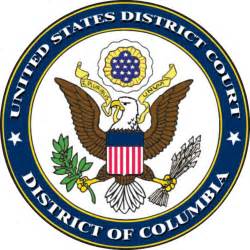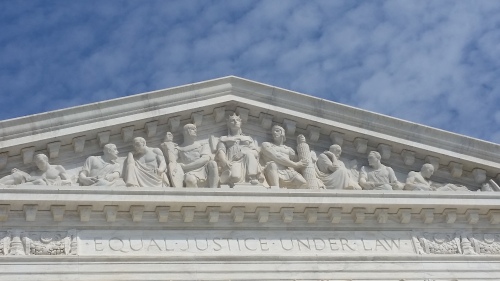A Commissioner at the Federal Election Commission (FEC), Matthew Petersen is the last of four Trump nominees to the U.S. District Court for the District of Columbia to come before the Senate Judiciary Committee. While Petersen boasts extensive experience in election law, he may face pushback based on his tenure at the FEC.
Background
Matthew Spencer Petersen was born in Torrance, CA in 1970. He matriculated at Utah State University in 1988 and then at Utah Valley University (then Utah Valley State College) in 1991, graduating with an A.S. with High Honors in 1996. Petersen also matriculated at the University of Utah in 1993, transferring to Brigham Young University in 1994, and getting a B.A. magna cum laude in 1996.
Petersen then joined the University of Virginia School of Law, graduating in 1999. After graduating, Petersen joined the Washington D.C. Office of Wiley Rein.
In 2002, Petersen was hired by the Republican majority on the Committee on House Administration as Majority Counsel. He served in that capacity for three years, notwithstanding a short stint as Counsel to the Republican National Committee in late 2004. In 2005, Petersen moved to the Senate to work as Chief Counsel for the Republicans on the Committee on Rules and Administration.
In 2008, Petersen was one of five new appointments to the FEC, a regulatory agency seeking to enforce campaign finance law.[1] Specifically, Petersen was nominated to replace Hans Von Spakowsky, the controversial nominee previously recess-appointed to the Commission by President George W. Bush.[2] While his term expired in 2011, Petersen continues to serve as a Republican representative on the Commission.
History of the Seat
The seat Petersen has been nominated for opened on March 16, 2016, with Judge Richard Roberts’ move to early senior status. Roberts, an appointee of President Clinton, claimed the move was based on health reasons, but many speculated that Roberts was actually motivated by a different reason: a civil rights suit filed against him based on his relationship (while a young prosecutor) with a key witness in the trial he was managing.[3] On April 28, 2016, President Obama nominated D.C. Superior Court Judge Todd Edelman to the vacancy. However, the Republican controlled Senate Judiciary Committee did not take any action on Edelman’s nomination, and it was returned to the President at the end of the 114th Congress.
On May 20, 2017, Petersen was contacted by the White House Counsel’s Office to gauge his interest in an appointment to the U.S. District Court for the District of Columbia. (Notably, the current White House Counsel Don McGahn served as a Republican member of the FEC alongside Petersen for five years.) Petersen was formally nominated on September 11, 2017.
Legal Experience
Petersen has a relatively unusual background for a federal judicial nominee, having only spent three years working in litigation, and having spent significantly longer periods of time in legislative work and at the Federal Election Commission enforcing campaign finance laws.
Wiley Rein
Petersen’s litigation experience is limited to his time as an associate at Wiley Rein LLP where he served as an associate in the Election Law & Government Ethics practice group.[4] In this capacity, Petersen represented corporations seeking to comply with campaign finance regulations, as well as candidates seeking to defend charges brought by the FEC.[5]
Capitol Hill
After leaving Wiley Rein, Petersen served as Majority Counsel on the House Committee on Administration. In this role, Petersen served as a legal advisor to Chairman Robert Ney (R-OH), advising him on “legal and legislative matters relating to federal election and campaign finance laws.”[6] He also worked on complaints submitted to the House Franking Commission, which regulates the use of official congressional mailings. Notably, Petersen also helped draft the Help America Vote Act of 2002 (HAVA).
After a short stint at the RNC working to implement the HAVA during 2004 Presidential election, Petersen was hired by Sen. Trent Lott (R-MS) to serve as Chief Counsel for the Senate Committee on Administration. In this capacity, Petersen notably worked on legislation merging the U.S. Capitol Police and the Library of Congress Police.[7]
Federal Election Commission
Petersen was confirmed to the FEC on June 24, 2008, as package deal of nominees that dramatically changed the Commission’s make-up. Among his first acts on the FEC, Petersen joined with every other Commissioner in rejecting an effort by the Club for Growth (a conservative political group) to shorten disclosures on political advertisements.[8]
Early in Petersen’s tenure, the FEC drew criticism for a high number of 3-3 deadlocks, preventing enforcement action.[9] Specifically, the Republican Commissioners, Petersen, Don McGahn[10], and Caroline Hunter, were criticized for voting as a bloc and “undercutting federal election law and its enforcement.”[11] In one instance, Petersen, McGahn, and Hunter refused to support a proposed regulation governing corporate travel for lawmakers, forcing the adoption of a weaker rule that relaxed travel requirements for Senators.[12] Petersen defended his actions in an op-ed, arguing that “an agency cannot include in regulation what was not enacted through legislation.”[13] Petersen also wrote letters to the editor arguing that the proposed rule closely mirrored congressional intent,[14] and that the problem of FEC deadlocks is being exaggerated.[15] Instead, Petersen argued, the focus of the Republican commissioners is on reducing “[r]ote enforcement of hyper-technical rules” as this “has an unfair impact on the inexperienced [candidate].”[16]
However, throughout Petersen’s tenure, the FEC continued to draw criticism for being ineffective and being unable to enforce the law, specifically due to the Republican Commissioner’s refusals to take enforcement actions.[17] One article noted that since the appointments of Petersen, McGahn, and Hunter, the FEC’s rate of deadlocks had increased eightfold from 2% to 16%.[18] Another article noted: “If you’ve been thinking of breaking federal election law, this would be an excellent time to do it, because the chance of being caught is close to nil. There is no cop on the beat.”[19] In response, Petersen, Hunter, and McGahn wrote:
“Aggressive enforcement in cases where the law is vague or complicated undermines the rule of law. Few areas of the law demand more sensitivity to aggressive enforcement than those governing First Amendment-protected political speech.”
Ultimately, the FEC’s lack of enforcement drew a suit from the Campaign Legal Center, specifically challenging the lack of action against individuals alleged to be “straw donors” under the Federal Election Campaign Act.[20] The situation drew a rare public rebuke from Democratic Commissioner Ann Ravel, who resigned from the FEC in March 2017, arguing that “[t]he ability of the commission to perform its role has deteriorated significantly.”[21] In response, Republican Chairman Lee Goodman (who replaced McGahn in 2013) countered:
“the situation has indeed changed, but for the better.”[22]
Despite the controversy over the Republican bloc votes, Petersen has drawn positive reviews from Commissioners, with both Goodman and Commissioner Steven Walther, who vote in opposite blocs, praising him.[23]
Overall Assessment
So far, Trump’s appointments to the D.C. federal bench have not attracted much opposition. Trump has already successfully appointed three judges with widespread bipartisan support. Whether Petersen follows this trend or not depends on how senators evaluate his actions on the FEC. Petersen’s critics will argue, as many watchdog groups have, that Petersen joined with other FEC Republicans to stymie agency enforcement and cripple campaign finance laws. However, Petersen and his supporters will likely downplay FEC deadlocks as rare occurrences, and note that his votes were based on First Amendment concerns. They will also likely note that many of Petersen’s votes against enforcement were in favor of Democratic candidates, and that, as such, he cannot be considered overly partisan.
Overall, given the Republican senate majority, it is unlikely that Petersen will face much trouble getting confirmed. Ironically, his confirmation will further jeopardize the FEC’s effectiveness, leaving it with two out of six seats vacant.
[2] Matthew Mosk, Candidates’ Fundraising Disputes May Be Heard, Wash. Post, May 23, 2008.
[8] Matthew Murray, FEC Rejects Club’s Bid to Tweak Disclosure Rules, RollCall, July 29, 2008.
[9] Matthew Murray, FEC Deadlocks on the Rise, RollCall, Apr. 6, 2009.
[10] McGahn currently serves as Trump’s White House Counsel, and has a significant role in selecting judicial nominees.
[11] Editorial, Obama’s FEC, RollCall, Dec. 2, 2009.
[13] Matthew Petersen, FEC Implemented Congress’ Vision on Travel Rules, RollCall, Dec. 1, 2009.
[14] Matthew S. Petersen, Caroline S. Hunter, Donald F. McGahn, Travel Rules Follow the Law, Wash. Post, Dec. 7, 2009.
[15] Matthew S. Petersen, Caroline S. Hunter, Donald F. McGahn, Promoting Change, Not Paralysis, at the FEC, Wash. Post, June 19, 2009.
[17] Craig Holman, Guest Observer, RollCall, March 14, 2011.
[19] Dana Milbank, A Good Faith Effort to Break D.C. Gridlock, Wash. Post, Oct. 12, 2014.

